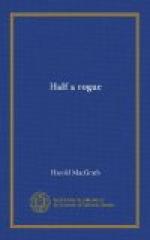Bennington was an accurate judge of men. He felt that he could trust this shock-headed journalist. If without any loss of self-respect, if without receding a single step from his position, he could avert the crash, he would gladly do so. He had reached one determination, and nothing on earth would swerve him. So he told Ben just exactly what would happen if the men went out. Ben did not doubt him for a moment. He, too, was something of a judge of men. This man would never back down.
“I give you this to show them, if your arguments do not prevail,” concluded Bennington, producing a folded paper. “They will hardly doubt this.”
Ben opened it. It was a permit from the municipal government to tear down a brick structure within the city limits. Ben stowed the permit in his pocket. He looked with admiration at the man who could plan, coolly and quietly, the destruction of a fortune that had taken a quarter of a century to build. He was grave. There was a big responsibility pressing on his shoulders.
“Much obliged. You will never regret the confidence you repose in me. Now I’ll tell you something on my side. It is not the inventor, though the men believe it is. The inventor is a pretext of Morrissy, the union leader.”
“A pretext?”
“I can’t prove what I say, that’s the trouble; but McQuade has his hand in this. I wish to Heaven I could find solid proofs.”
“McQuade?” Bennington scowled. He could readily understand now. McQuade! This was McQuade’s revenge. He could wait patiently all this while!
“I’ll do what I can, Mr. Bennington; I’ll do what I can.”
Bennington ate no lunch that noon. Instead, he wandered about the great smoky shops, sweeping his glance over the blast-furnaces, the gutters into which the molten ore was poured, the giant trip-hammers, the ponderous rolling-machines, the gas-furnaces for tempering fine steel. The men moved aside. Only here and there a man, grown old in the shops, touched his grimy cap. ... To tear it down! It would be like rending a limb, for he loved every brick and stone and girder, as his father before him had loved them. He squared his shoulders, and his jaws hardened. No man, without justice on his side, should dictate to him; no man should order him to hire this man or discharge that one. He alone had that right; he alone was master. Bennington was not a coward; he would not sell to another; he would not shirk the task laid out for his hand. Unionism, such as it stood, must receive a violent lesson. And McQuade?
“Damn him!” he muttered, his fingers knotting.




